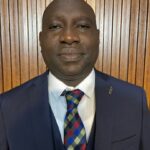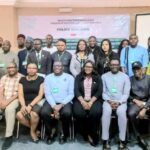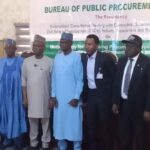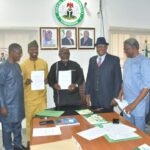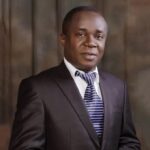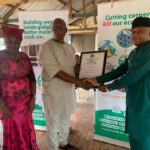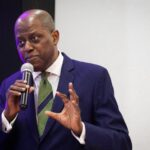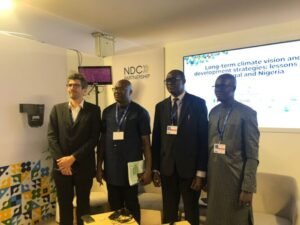
Lead, Deep Decarbonisation Pathways (DDP) Initiative, Institut du Développement Durable et des relations Internationales (IDDRI), Prof. Chukwumerije Okereke, Director, Center for Climate Change and Development, Nigeria, Dr Eugene Itua, CEO, Natural Eco Capital, Nigeria, Samba Fall, Climate and System Transition Manager, Enda Energie, Senegal at a knowledge sharing panel at COP28, Dubai.
By Fabian Ekeruche
Stakeholders at the ongoing UN 28 Conference of Parties on Climate Change(COP28) have hailed the processes leading to the formulation of Nigeria’s Long Term Low Emission Development Strategy(LTS).
They called on other developing nations to take a cue from it.
This formed part of the shared experience between top Nigerian delegations to the conference and their counterparts from Senegal which was monitored by the News Agency of Nigeria (NAN) from Lagos.
NAN reports that side event at the COP 28 which held at the NDC Pavilion was titled: Long Term Climate Vision and Development Strategies: Lessons from Nigeria and Senegal.
Speaking at the event, Dr Eugene Itua, Chief Executive Officer, Natural Eco – Capital, said that the LTS was Nigeria’s means of achieving the country’s Long Term Vision of Net Zero emission by 2060.
Itua said that the strategy adopted by Nigeria was country- driven.
According to him, no fewer than 34 Nigerian experts participated in one way or the other in developing the document.
“The last aspect of it was peer review; then, there was validation which afforded many Nigerians the opportunity to make contributions to it.’’
The chief executive officer said that a major part of the process was alignment- which afforded the team to work in synergy with other stakeholders.
“Working in synergy, we came up with a document that has laid a beautiful foundation for other countries to follow,” Itua said.
Prof. Chukwumerije Okereke, the Director of the Centre of Climate Change and Development, Alex Ekwueme Federal University, Ebonyi, also spoke at the event.
He said that every country trying to develop its long term strategy should form a steering committee and a technical committee.
Okereke said that the steering committee in the case of Nigeria consisted of 12 directors from the ministries who met regularly to question the team’s assumptions, data sources and made input.
He said that there was the second committee–the technical committee–which was below the steering committee comprising 14 to 20 members selected from various ministries, departments and agencies of government who also met regularly.
Okereke said that there were suggestions to include other stakeholders from the private sector and the academia to guide the team in working out the long term strategy.
“That is why we can truly say that the document we produced was the voice of Nigerians and thus distinguished from its precursor, the Energy Transition Plan (ETP), which is a very good document but it was produced by a smaller fraction of people, driven by Mackenzie, which formed the basis for which Nigeria met the Net Zero.
“So, when we first started the process for the LTS, we discovered that as good as the ETP was, it ignored an important aspect known as the AFOLU (Agriculture, Forestry and Other Land Use).
“It is difficult to achieve Net Zero target without AFOLU, which is the biggest source of subsector emission in Nigeria.
“The LTS we have done now integrates back the AFOLU emissions.
“It then means that the baseline for reducing to Net Zero was harder than it was thought when the ETP was designed.’’
He explained that when Nigeria did the expansive emission analysis using the same baseline as 2018 which was the basis for the Nationally Determined Contribution (NDC), it was discovered that Nigeria’s emission was higher than was reported in the NDC.
“This is because we went deeper into the AFOLU and also the transport sector.
“We could only do this because we had more indigenous technical people doing the analysis,” Okereke said.
He noted that a large percentage of African NDC had been written by experts from abroad, except South Africa and Nigeria.
The representative from Senegal, Mr Samba Fall, Climate and System Transition Manager, Enda Energie, Senegal, said that setting up his country’s LTS had been very innovative.
Fall said that Senegal had a pool of five ambassadors including researchers and policy makers.
He underscored the importance of the five groups since the country was working in different transitions including agriculture, energy and Industry.
Fall said it was a bit difficult at the onset; however, he added that Senegal developed a synergy between the ministry of the environment and that of petroleum and energy to make headway.
He said that the overall objective for Senegal was not just about planning for the LTS, but that the process, relying on local experts has positioned Senegal to plan for any climate change development issue.
Fall noted that there was a lot to learn from Nigeria in its approach to achieving its long term development strategy, adding that the lessons from Nigeria could be used to develop a regional West African LTS. (NAN)(www.nannews.ng)
Edited by Chijioke Okoronkwo

